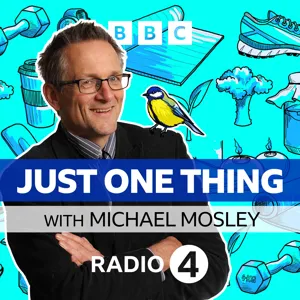Podcast Summary
Incorporating olive oil into your diet for mental and physical well-being: Olive oil, rich in polyphenols and oleic acid, reduces inflammation, improves memory, and lowers blood pressure. Choose extra virgin olive oil for health advantages and flavor.
When it comes to enhancing both mental and physical well-being, incorporating olive oil into your diet could be a simple yet effective solution. Olive oil, a key component of the Mediterranean diet, is rich in polyphenols and oleic acid, which have been linked to numerous health benefits. These include reducing inflammation, improving memory, and lowering blood pressure. By choosing extra virgin olive oil, you not only gain its health advantages but also enjoy its peppery finish and delicious flavor. So, consider adding a tablespoon of olive oil to your meals daily for an easy yet impactful change in your lifestyle. Additionally, we heard about two companies offering attractive deals. Blue Nile, an online jewelry store, allows you to design a unique ring and get it delivered to your door with a discount using the promo code 'listen'. Mint Mobile, a wireless service provider, is cutting its monthly price from $30 to $15 for new customers, making it an affordable option for those looking to switch. Lastly, Just One Thing, a new podcast by Michael Mosley, explores various ways to improve health and life with simple yet effective practices. In the first episode, he discusses the benefits of olive oil and encourages listeners to try it as a starting point for better health.
Olive oil: A heart-healthy and brain-boosting addition to your diet: Olive oil, whether extra virgin or regular, is safe for cooking and offers heart and brain health benefits. Incorporate 2 tbsp daily for potential inflammation reduction, memory improvement, and cardiovascular disease risk lowering.
Olive oil, whether extra virgin or regular, offers numerous health benefits, particularly for the heart and brain. Contrary to popular belief, olive oil is safe for cooking at high temperatures, and using it regularly can help reduce inflammation, improve memory, and potentially lower the risk of cardiovascular disease. Research suggests that extra virgin olive oil, with its higher polyphenol content, may confer additional health benefits. A simple way to incorporate more olive oil into your diet is to have two tablespoons a day, either raw on salads or cooked with regular olive oil for savory dishes. The potential health advantages of olive oil make it a worthwhile addition to any diet.
Olive oil's positive impact on heart health: A study found improvements in heart disease markers for both extra virgin and refined olive oil consumers, suggesting its benefits extend beyond just heart health.
Olive oil, whether extra virgin or refined, has been shown to have positive effects on heart health based on a study that looked at biomarkers in urine samples. The study found statistically significant improvements in heart disease markers for both groups, regardless of the type of olive oil consumed. The speaker, Bill Mullen, a researcher from the University of Glasgow, explained that while cholesterol can be a risk factor for heart disease, it's not the only indicator, and that their research aims to find a more accurate way to predict who will develop heart disease. The speaker is a personal fan of olive oil and consumes it regularly, and the study suggests that its benefits extend beyond just heart health, as the speaker also enjoys the taste and uses it in various ways in place of other oils or fats.
Olive oil's health benefits beyond polyphenols: Olive oil's major component, oleic acid, contributes to its anti-inflammatory effects and potential to prevent arterial damage, reducing risk of conditions like vascular dementia. Cooking with it enhances taste and love for meals.
Olive oil, regardless of its extrovergent or not, provides health benefits beyond just its polyphenol content. The major component, oleic acid, is believed to be the primary contributor to olive oil's anti-inflammatory effects and potential to prevent damage to the endothelial and collagen in the arterial walls. This can help prevent plaque buildup and benefit not only the coronary arteries but also the brain, potentially reducing the risk of conditions like vascular dementia. A daily intake of approximately 20 ml or a couple of dessert spoons is recommended for a beneficial effect. The use of olive oil in cooking can also enhance the taste of meals and even rekindle a love for cooking.
Simple actions for joy and health: Cooking lentil soup, learning music, appreciating history, and treating loved ones can bring joy, improve health, and create meaningful experiences
Incorporating simple actions into your daily routine can have significant positive impacts on both your physical and mental wellbeing. Cooking a lentil soup with olive oil is an example of a small action that benefits your heart, brain, and joints. Learning to play a musical instrument is another example that can improve mood, memory, and immune system. Appreciating British history, whether through comedy or history shows, can provide enjoyment and new perspectives. For Mother's Day, treating mom to high-quality goods from Whole Foods Market or Quince is a thoughtful way to show appreciation without breaking the bank. These small actions can bring joy, health benefits, and create meaningful experiences. So, try making that lentil soup, learning a new skill, or treating yourself or a loved one to something special today.




